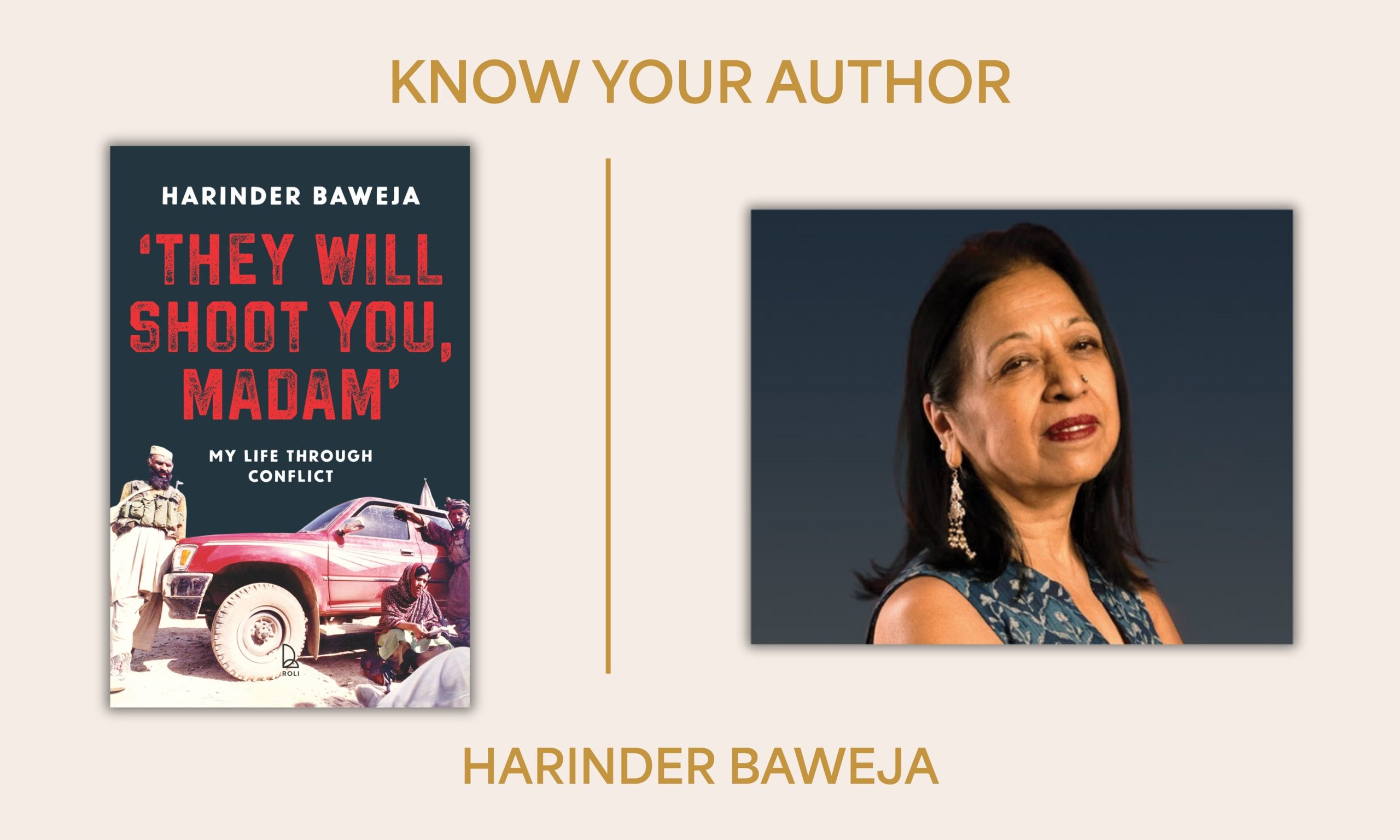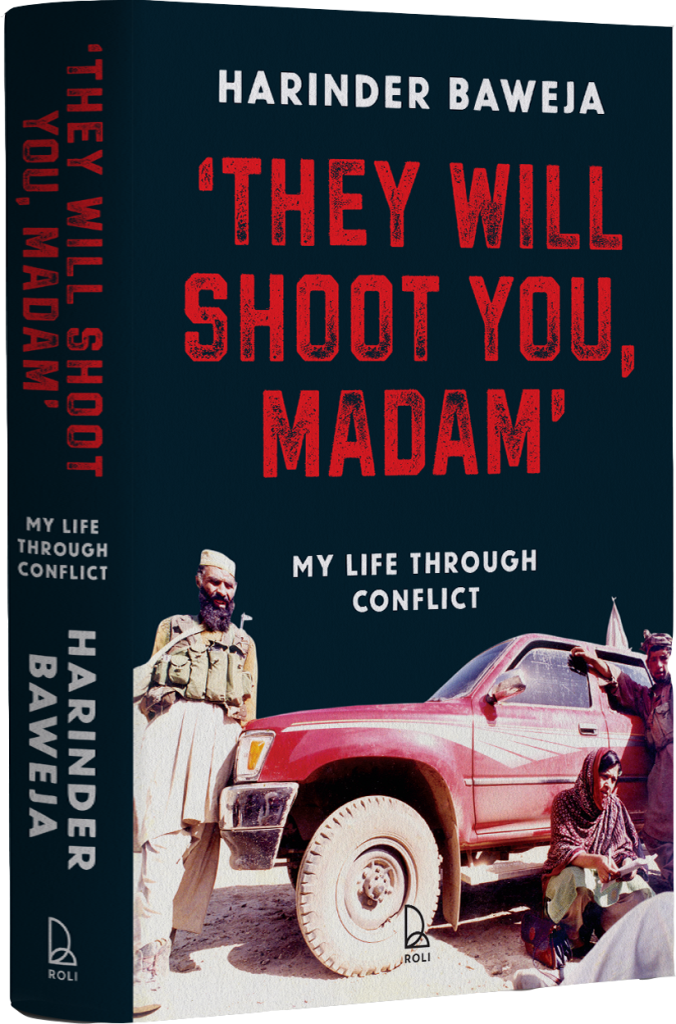From Operation Blue Star to Article 370, from Kabul to Kashmir, Harinder Baweja has witnessed it all. Her new memoir, They Will Shoot You, Madam’: My Life Through Conflict, takes you inside 40 years of India’s biggest conflicts and their profound human impact. It is not just a memoir. It is the untold story of conflict, courage, and the human cost of politics. Harinder has been honoured for her work and has won the prestigious Ramnath Goenka Award for excellence in journalism, the Prabha Dutt award, and the Haldighati award. Here is a candid interview we recently conducted with her.
1. You began your journey as a journalist in the aftermath of Operation Blue Star. Looking back, how did covering Punjab in the 1980s shape your understanding of conflict and its political roots?
Interestingly, my editor chose to send me to Punjab because in his mind, he saw me as ‘Sikh’ and as a Fauji kid who had grown up around arms and ammunition. All I have ever strived for is to be a journalist, not a Sikh journalist or a woman journalist. The Punjab battlefield was my first exposure to conflict and its many fissures. I understood, almost immediately, that conflicts are fuelled by politicians and governments. Indira Gandhi paid with her life by ordering the army into the Golden Temple, after giving wind to Bhindranwale’s sails. Mixing religion and politics makes for a heady mix but it also creates Frankenstein monsters.
2. As one of the very few women reporters in Punjab in the 1980s, you faced hostility and petty attacks. How do you reflect on the progress – or lack of it – for women journalists in conflict reporting today?
Women journalists have come a long way since the ’80s when I was counted amongst the very few. They are now a part of every newsroom and have broken every glass ceiling. The progress is heartening and in fact, was only a matter of time.
3. From Punjab to Ayodhya, your book shows how political misadventures fuel conflict. What’s the lesson Indian politics still hasn’t learned?
The lessons are clear: don’t mix religion and politics. The problem, however, is that this is one lesson the politicians deliberately don’t want to learn. The more you divide, the longer you rule.
4. Journalism then versus now: What’s the one thing today’s newsrooms have lost that you value most?
I don’t quite recognize the way journalism is practiced today. The lack of neutrality, the unwillingness to hold the powerful to account stand out as stark reminders of the past and the present.
5. You describe how difficult it is to earn ‘neutrality’ in Kashmir, with each side insisting on its version of truth. What practices or principles helped you maintain balance and credibility in such polarized environments?
It is a very tight rope to walk and it takes years to build trust with the different sides. Read the chapter on Yasin Malik to understand how difficult it is to walk the neutrality path. It is akin to walking through landmines – slowly and carefully – in the hope that you won’t step on one.
6. You have interviewed militants, criminals, and terror masterminds. Was there ever a moment when their words or worldview shook you more than the violence itself?
The words of Jagir Singh, dreaded terrorist and head of the Panthic Committee (in the Punjab chapter) had a profound impact on me. In the course of an interview, I asked him about why levels of violence were down and he fell uncomfortably silent before saying, “You don’t have to eat two chappatis every day. On some days you feel more hungry.” I swore never to measure violence through data after that.
7. After decades of writing investigative stories, what did writing a book teach you that journalism never could?
The passage of time and hindsight allow you to dwell on your own experiences through conflict zones, and that in turn helps you process information stored within you. A book allows you to take a backseat. The constant rush of deadlines keeps you from processing personal experiences.
8. If a movie were made on your life as a reporter, who would you want to play ‘Bullet Baweja’?
That was a friendly newsroom title. I don’t take myself so seriously. I certainly don’t see myself like that.
9. If you had to describe four decades of reporting India’s conflicts in one word, what would it be?
SEARING.
10. You have reported from some of the most challenging conflict zones and led coverage of major, impactful stories. Is there a story you still dream of pursuing, or a ‘dream assignment’ you wish you could have taken on?
I would jump at the opportunity of returning to Afghanistan where the Taliban have returned as its rulers. I would love to chronicle their second term in power, even though that was most definitely the most claustrophobic assignment of my entire career.
11. What are a few books that you have read that have stayed with you?
I am a news junkie and an avid consumer of non-fiction titles. In all honesty, I cannot name particular books but When a Tree Shook Delhi, on the 1984 anti-Sikh carnage, authored by H.S. Phoolka and Manoj Mitta is powerful for the truth that it portrays. I also continuously read and re-read short stories by the great Manto. Train to Pakistan by the legendary Khushwant Singh is another book I often turn to, time and again.
12. And finally, after everything you’ve witnessed, what still gives you hope?
India gives me hope. Individual Indians who believe in the power of opening conversations give me hope. I don’t easily despair and even when I do, it is for short spells. Mohammad Rafi’s songs like, Tu Hindu banega na Musalmaan banega, Insaan ki aulad heh, insaan banega is my “rational anthem”.


